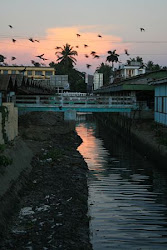မဇၩိမသတင္းဌာန
ေသာၾကာေန႔၊ ဧၿပီလ 17 2009 19:43 - ျမန္မာစံေတာ္ခ်ိန္
ရန္ကုန္။ ။ ျမန္မာႏုိင္ငံတြင္ တုိင္းျပည္၏ သဘာဝ ရင္းျမစ္မ်ားတြင္ ထည့္ဝင္ထားမႈမ်ားကို ေရာင္းခ်ျခင္း၊ လႊဲေျပာင္းျခင္းႏွင့္ သက္ဆုိင္သည့္ လက္တေလာ တားျမစ္ကန္႔သတ္ခ်က္မ်ားကုိ လာမည့္ အနာဂတ္တြင္ ေလွ်ာ့ခ်ရန္ ေရနံႏွင့္ သဘာဝဓာတ္ေငြ႔ ရွာေဖြတူးေဖာ္ေရးႏွင့္ ထုတ္လုပ္ေရး လုပ္ငန္းမ်ားတြင္ လုပ္ကုိင္ေနသည့္ ကုမၸဏီမ်ားက ေမွ်ာ္လင့္ေနသည္။
“ေရနံႏွင့္ သဘာဝဓာတ္ေငြ႔ ရွာေဖြေဖာ္ထုတ္ေရး ကဲ့သုိ႔ေသာ စြန္႔စားရသည့္ စီးပြားေရး လုပ္ငန္းမ်ားတြင္၊ အဆုိပါ စြန္႔စားရမႈမ်ားႏွင့္ လုပ္ငန္း ဆက္လက္လည္ပတ္ႏုိင္မႈကုိ ထိန္းသိမ္းထားႏုိင္ရန္အတြက္၊ ပုိင္ဆုိင္မႈမ်ား လႊဲေျပာင္းျခင္း၊ ေရာင္းခ်ျခင္းသည္ ႏုိင္ငံတကာတြင္ က်င့္သုံးေနသည့္ အေရးၾကီးေသာ အခ်က္တခု ျဖစ္သည္” ဟု ျမန္မာႏုိင္ငံတြင္ လုပ္ကုိင္ေနသည့္ ႏုိင္ငံျခား ေရနံကုမၸဏီတခုႏွင့္ နီးစပ္သည့္ ရင္းျမစ္တခုမွ ေျပာဆုိခဲ့သည္။
ကမ္းလြန္ႏွင့္ ကုန္းတြင္း ႏွစ္မ်ဳိးစလုံးရွိ လုပ္ကြက္မ်ားတြင္ ထည့္ဝင္ လုပ္ကုိင္ေနသည့္ ပုိင္ဆုိင္မႈမ်ား လက္လႊဲ ေရာင္းခ်ျခင္းကုိ တုိက္႐ုိက္ပိတ္ပင္သည့္ ဥပေဒတရပ္ကုိ စစ္အစုိးရ၏ စြမ္းအင္ဝန္ၾကီးဌာနမွ ၿပီးခဲ့သည့္ စက္တင္ဘာက ထုတ္ျပန္ခဲ့သည္။ ယင္း၏ အက်ဳိးဆက္အေနျဖင့္ ရွာေဖြေဖာ္ထုတ္မႈမ်ားတြင္ သုံးစြဲေနမႈမ်ားကို ေလ်ာ့က်ေစေၾကာင္းႏွင့္ ကုန္က်စရိတ္ ၾကီးမားလွသည့္ ထုိလုပ္ငန္းတြင္ ေယဘုယ်အားျဖင့္ ကုမၸဏီမ်ားသည္ ရွာေဖြျခင္းႏွင့္ တူးေဖာ္ျခင္းတုိ႔တြင္ အဆိုပါ ကုန္က်စရိတ္မ်ားကုိ မွ်ေဝကုန္က်ျခင္း၊ သုိ႔မဟုတ္ ထည့္ဝင္ထားသည့္ ရွယ္ယာမ်ားကို ဖလွယ္ျခင္းတုိ႔ကို ျပဳလုပ္ရေၾကာင္း အဆုိပါ သတင္းရင္းျမစ္က ထည့္သြင္းေျပာဆုိသည္။
“ဒီလုပ္ငန္းဟာ အရင္းအႏွီးနဲ႔ နည္းပညာကုိ အဓိကထား ဦးစားေပးၿပီး လုပ္ရတဲ့ လုပ္ငန္းျဖစ္တဲ့အတြက္၊ တုိင္းျပည္မွာ ႏုိင္ငံျခား ကုမၸဏီမ်ားအေပၚ အားထားျခင္းမွလြဲ၍ အျခားေရြးခ်ယ္စရာ လမ္း မရွိပါဘူး။ ဒါေၾကာင့္ အစုိးရ အေနျဖင့္ ၎တုိ႔၏ တားျမစ္ ကန္႔သတ္ထားမႈမ်ားကို ျပန္လည္စဥ္းစားသင့္ေၾကာင္း” ကြ်မ္းက်င္သူတဦးက ေျပာဆုိခဲ့သည္။
တြင္းတတြင္း ရွာေဖြေဖာ္ထုတ္မႈ၏ ကုန္က်စရိတ္သည္ ခန္႔မွန္းေျခအားျဖင့္ အေမရိကန္ေဒၚလာ ၂၅ သန္းမွ သန္း ၃ဝ အထိ ရွိၿပီး၊ ပထဝီ ေျမအေနအထားဆုိင္ရာ ေလ့လာသုေတသနျပဳမႈတြင္ ၾကိဳတင္လုပ္ေဆာင္ထားမႈမ်ား ရွိေနေသာ္ျငားလည္း ေအာင္ျမင္မႈမွာ အၿမဲတမ္း မေသခ်ာပါ။
ရွယ္ယာ လက္လႊဲ ေရာင္းခ်မႈမ်ားကုိ ဆက္လက္ တားျမစ္ပိတ္ပင္ထားျခင္းသည္ အနာဂတ္တြင္ ေရနံႏွင့္ သဘာဝဓာတ္ေငြ႔ ရွာေဖြေဖာ္ထုတ္မႈမ်ားကို ေလ်ာ့က်သြားေစမွာ ျဖစ္ၿပီး၊ အက်ဳိးဆက္အေနျဖင့္ ရင္းျမစ္အသစ္မ်ား ရွာေဖြေတြ႔ရွိမႈႏွင့္ ကုမၸဏီ၏ ဝင္ေငြကိုလည္း ေလ်ာ့က်သြားေစမွာျဖစ္ေၾကာင္း ေလာင္စာစြမ္းအင္ဆုိင္ရာ ကြ်မ္းက်င္သူက ေျပာသည္။
ပီအက္စီ ေခၚ ရွယ္ယာထည့္ဝင္ ပူးတြဲထုတ္လုပ္ေရး ကန္ထ႐ုိက္စနစ္ကုိ ႏုိင္ငံတကာ၌ က်ယ္ျပန္႔စြာ အသုံးျပဳေနၿပီး၊ ထည့္ဝင္ထားသည့္ ရင္းႏွီးျမႇဳပ္ႏံွထားမႈမ်ားကို ႏုိင္ငံျခား ကုမၸဏီမ်ား အခ်င္းခ်င္းအၾကား ေရာင္းခ်ျခင္း၊ ဖလွယ္ျခင္းကို ခြင့္ျပဳထားသည္ဟု သူက ေျပာဆိုသည္။
သို႔ေသာ္လည္း၊ ျမန္မာႏုိင္ငံတြင္ ထုိကဲ့သုိ႔ လဲလွယ္ျခင္းကို ပိတ္ပင္ထားသည့္အတြက္၊ ထုိင္း ပီတီတီအီးပီသည္ တ႐ုတ္ စီအင္အုိအုိစီႏွင့္ လဲလွယ္မည့္ အက်ဳိးစီးပြားတခုကို ဖ်က္သိမ္းလုိက္ရေၾကာင္း ယခုႏွစ္ ေဖေဖာ္ဝါရီလတြင္ ထုိင္း ပီတီတီအီးပီ (PTTEP) မွ ထုတ္ျပန္သည့္ ေက်ညာခ်က္ထဲ၌ ေဖာ္ျပထားခဲ့သည္။
ျမန္မာႏုိင္ငံတြင္ ရင္းႏွီးလုပ္ကုိင္ေနသည့္ အျခားေသာ ႏုိင္ငံျခားမွ ေလာင္စာစြမ္းအင္ဆုိင္ရာ ကုမၸဏီမ်ား ျဖစ္သည့္ ေတာင္ကုိရီးယား ေဒဝူး အင္တာေနရွင္နယ္၊ ျပင္သစ္ တုိတယ္၊ အေမရိကန္ ရွယ္ဗရြန္၊ ဂ်ပန္ နီပြန္ အြိဳင္းလ္ႏွင့္ မေလးရွား ပက္ထ႐ုိနာ့စ္ တုိ႔လည္း အက်ဳံးဝင္သည္။
ျမန္မာႏုိင္ငံသည္ ၂ဝဝ၆-ဝ၇ ဘ႑ာေရး ႏွစ္ထဲ၌ပင္ ထုိင္းႏုိင္ငံသုိ႔ သဘာဝဓာတ္ေငြ႔ တင္ပုိ႔ေရာင္းခ်မႈမွ အေမရိကန္ ေဒၚလာ ၂ ဒႆမ ၁၆ ဘီလီယံ ဝင္ေငြ ရရွိခဲ့သည္။
ထုိ ကိန္းဂဏန္းသည္ ၂ဝဝ၉ ႏွင့္ ၂ဝ၁၁ ခုႏွစ္တို႔တြင္ ရခုိင္ကမ္း႐ုိးတန္းႏွင့္ မုတၱမ ပင္လယ္ေကြ႔မွ ထြက္ရွိမည့္ သဘာဝဓာတ္ေငြ႔မ်ားကုိပါ ထည့္သြင္းပါက ႏွစ္ဆ တုိးလာမည္ ျဖစ္သည္။
Burma to reconsider restrictions on energy exploration
by Moe Thu
Friday, 17 April 2009 09:29
Rangoon (Mizzima) - Oil and gas exploration and production companies in Burma are hoping for a forthcoming easing in restrictions on the current ban related to the selling and transferring of stakes in the country’s natural resources.“Transferring and selling stakes is an important option, which is internationally practiced, in such a risky business as oil and gas exploration, in order both to offset risks and to sustain operations,” said a source with a foreign oil company active in the Burma.
The military government’s Ministry of Energy last September released a directive banning the sale of stakes in both offshore and onshore blocks.Sources said the measure has resulted in the reduction of expenditure in exploration, a costly undertaking in which companies typically share expenses or exchange shares in exploring and drilling, sources added.“As the industry is capital and technological intensive in nature, the country has no other option but to rely on foreign firms, which is why the government is expected to reconsider the ban,” commented one expert.
The drilling of a single exploratory well costs approximately U.S. 25 to 30 million dollars, with success never assured despite preliminary geological surveys.
The energy expert added that the continued prevention of share transfers would likely result in a further decrease in exploration and a corresponding loss in the discovery of new resources and company revenue.
He said the Production Sharing Contract (PSC), widely used internationally, allows for the selling or exchanging of stakes between foreign oil companies.However, because of the ban on swaps in Burma, Thailand’s PTT Exploration and Production (PTTEP) said in a statement released in February of this year that it was forced to cancel an interest swap deal with China National Offshore Oil Corporation (CNOOC).
Other foreign energy companies active in Burma include South Korea’s Daewoo International, France’s Total, Chevron of the United States, Japan’s Nippon Oil and Malaysia’s Petronas.
Burma earned US$2.16 billion from the export of natural gas to Thailand alone during the 2006-07 financial year – a figure expected to double once deposits off the cost of Rakhine and Mottama become available for export in 2009 and 2011, respectively.
Subscribe to:
Post Comments (Atom)





No comments:
Post a Comment